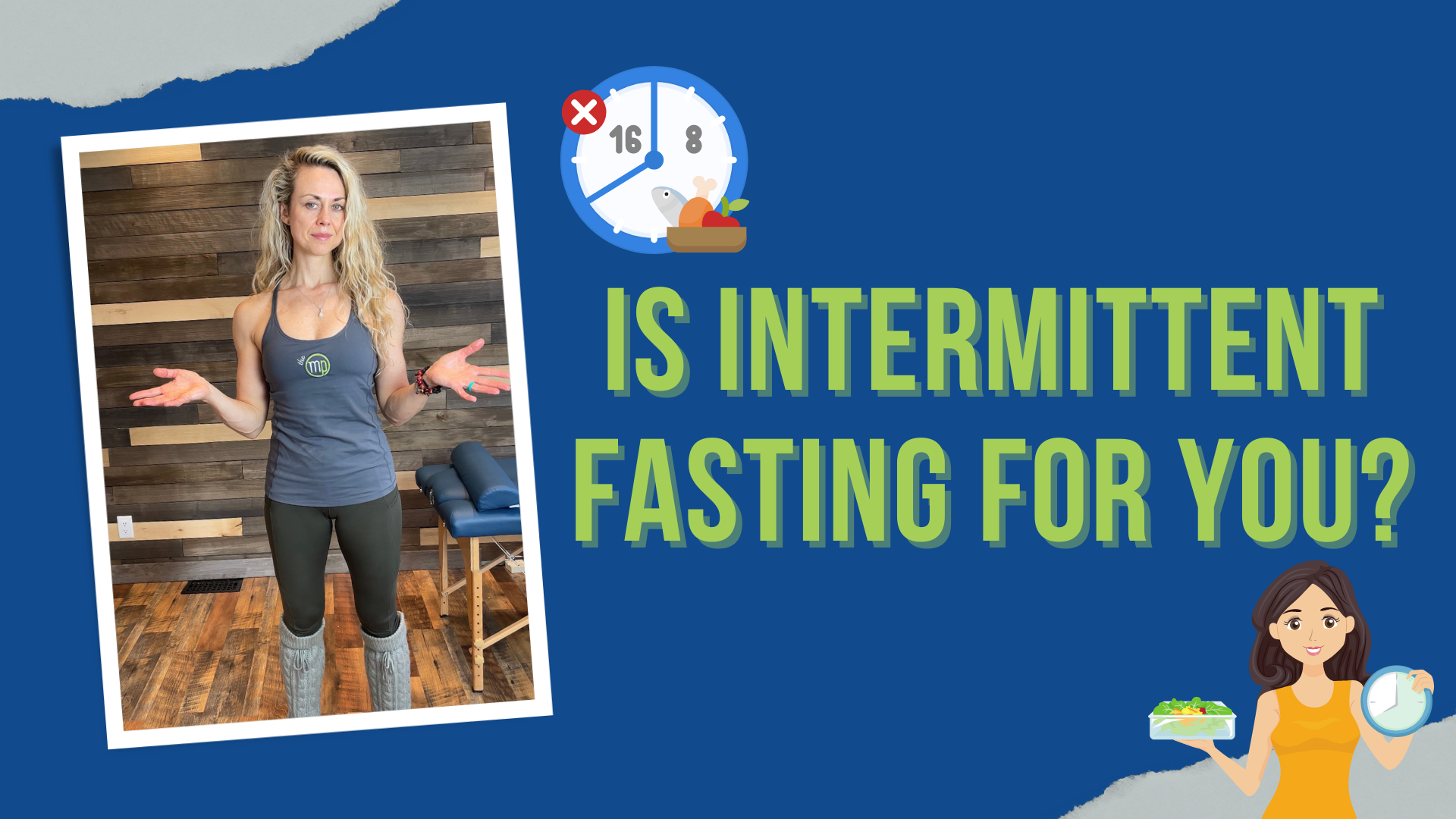Have you heard about intermittent fasting? Maybe you’ve had a friend or family member who’s been successful with it and you are wondering if you should, too? Let’s dive into what intermittent fasting is, the types of fast, its potential benefits and adverse effects, and how you can incorporate it safely into your life.
Rather watch or listen?
Intermittent fasting is a broad term defined as periods of feeding and restricting. This can include many different forms. Think of intermittent fasting as an umbrella term.
Here are four common ways to intermittent fast:
1. Time-Restricted Feeding
This involves prolonging the amount of time that you’re not eating and shortening the time that you’re feeding. The most common example of this is a 12 hour fast from night until the next morning. For example, eating dinner at 7:00 p.m. and then eating breakfast at 7:00 a.m. If you were prolonging that further, you could fast up to 16 hours. A 12 to 16-hour fast is most common, although more is an option as well.
2. Alternate Day Fast
This involves eating your normal calories on one day and on the next day you have a decreased caloric intake of approximately 600 calories.
3. Modified Fasting
This could involve reducing your caloric intake by about 10 to 20% on a day or multiple days a week. You could go as little as 600 calories.
4. Fasting Mimicking Diet
This is typically done one time per month for five days. During the five days, you would consume a ketogenic diet, which is high in fat, low in protein, and very low in carbohydrates. This would be done on five consecutive days once a month as a means of a cyclical fasting-mimicking period.
Benefits
The next big question is what the benefits of fasting are, and there are quite a few. It is important to recognize that there are a lot of mice studies and some human studies, so there needs to be more research with greater human subject samples.
Additionally, restricted eating, intermittent fasting, carbohydrate restriction, and caloric restriction can all have similar effects on the body. Autophagy, our natural cell recycling program, can be improved through all three of these.
Shorter-term studies on mice and humans show that there can be a positive effect on insulin resistance, blood pressure, blood sugar, lipids, as well as inflammation, weight loss, and even brain health. There’s no doubt that longer-term studies on humans are needed to support the long-term benefits of sustained weight loss.
Who should use caution?
Now, who should use caution with intermittent fasting?
First, I believe that you should work with a health practitioner to guide you and coach you to make sure that this is the right time and the right plan for you. Anyone that is frail, pregnant, has a previous eating disorder, has disordered eating should not fast.
If you have low blood pressure, heart arrhythmias, or insulin-dependent diabetes, you also should not fast. Perhaps one of the biggest reasons that is overlooked is if you have an HPA Axis dysfunction, hypothalamic pituitary adrenal dysfunction. This is our main stress pathway in our body.
If you’re under chronic stress, it is not a good idea to do intermittent fasting. This perhaps may be the sole reason why I choose to not put many of my patients on intermittent fasting because. It can be yet another stressor on their body that they can’t tolerate at this time. I’m also very cautious to do intermittent fasting with women, especially if they are dealing with existing hormonal issues, such as cortisol dysregulation, estrogen dominance, or low progesterone.
For men, however, I have found that it can be very helpful, but there are some things to think about even beyond the things I just mentioned. It depends on your specific goal if intermittent fasting will help you achieve your goal. For example, if you are lifting to build muscle mass, you have to eat more calories. Intermittent fasting may not be the best fit because it may be very hard to get in all the calories that you need in a condensed period of time. It is important to think about what your goals are, your current health conditions, or the concerns that you’re working with.
Tips for successful fasting
If you decide to give it a try, track how you’re feeling for at least one month. If fasting is helping you meet your goals, stick with it. If it’s not, stop. It’s that simple. If it’s a way of life for you, fantastic, but it’s not and your body’s not responding the way you thought, it’s okay to change gears and move in a different direction.
- Make sure that you’re drinking a lot of water.
- Clean your gut and health up first.
- If you are waking up and drinking bulletproof coffee with ghee and MCT oil, you have already broken the fast. If you put creamer in your coffee, you’ve broken the fast.
- Build up tolerance slowly. Start at 10 hours, 11, 12, and so on. For women, I would recommend no more than 14 hours and for men up to 16.
- If you feel unwell at any point, stop the fast and reconsider if this is the right approach for you?
Having metabolic flexibility, being able to fast and feed is very powerful and is evolutionary in nature. If you decide to, make sure you are taking all the necessary steps and track your journey.
Need help? Reach out for a 15-minute FREE discovery session to see how we can help you on your journey.

